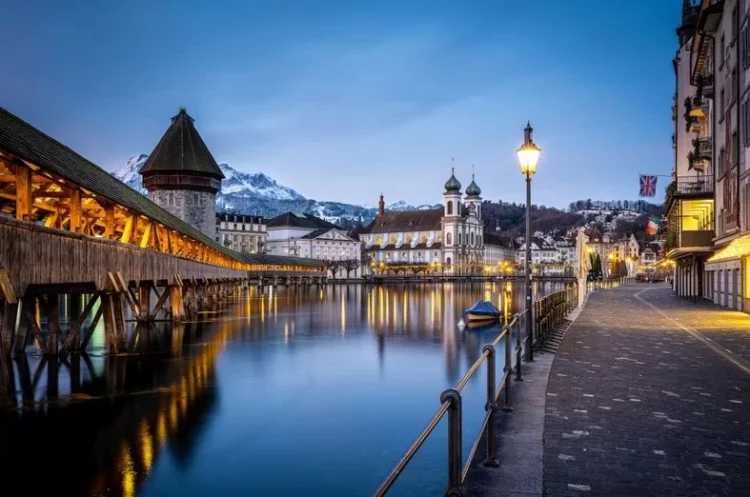Introduction: Exploring the Rich Cultural Heritage of Lake Lucerne
Nestled in the heart of Switzerland, Lake Lucerne (Vierwaldstättersee) is not only a place of natural beauty but also a hub of fascinating cultural customs and traditions. Surrounded by the majestic Swiss Alps and dotted with picturesque towns and villages, the region of Lake Lucerne offers travelers a chance to experience Swiss culture at its most authentic. The cultural practices here are deeply rooted in centuries of history, influenced by the Swiss way of life, regional dialects, and the interplay between the alpine environment and modern influences.
In this article, we will explore the unique cultural customs of Lake Lucerne, delving into local festivals, traditional arts and crafts, culinary delights, daily life, and the way of thinking that has shaped the people of this beautiful region. From the historical significance of Lucerne’s Old Town to the community celebrations on the shores of the lake, you will discover the rich tapestry of Swiss culture in one of the country’s most iconic locations.
1. What Role Does Lake Lucerne Play in Swiss National Identity?
The cultural identity of Lake Lucerne is intertwined with the broader Swiss national identity, which is heavily influenced by the country’s geography, political structure, and history. Lake Lucerne, often referred to as the “Swiss Lake,” holds a unique place in Switzerland’s cultural history.
The Origins of Swiss Confederation
The region of Lake Lucerne played a crucial role in the formation of Switzerland as a nation. In 1291, the founding cantons of Uri, Schwyz, and Unterwalden signed a pact of mutual defense on the shores of Lake Lucerne. This pact laid the foundation for the Swiss Confederation and is considered one of the key moments in Swiss history. The lake itself became a symbol of unity and Swiss independence.
The Connection Between Lake Lucerne and Swiss Traditions
Swiss culture places a strong emphasis on community, self-reliance, and local pride. Lake Lucerne’s residents still embody these values, with many local customs preserving the old ways of life. From folk music and traditional craftsmanship to the region’s distinct dialects, the cultural practices of Lake Lucerne reflect both the pastoral simplicity of rural Switzerland and the historical significance of this area in shaping the nation’s character.
2. What Are the Most Important Festivals in Lake Lucerne?
The cultural customs of Lake Lucerne are perhaps most evident in the region’s vibrant festivals, which celebrate everything from Swiss history to contemporary arts. These festivals offer visitors a chance to experience the area’s customs firsthand, blending ancient traditions with modern celebrations.
Lucerne Festival: A Celebration of Classical Music
One of the most prestigious cultural events in Switzerland, the Lucerne Festival is an annual music festival held every summer. Founded in 1938, it has become one of the most significant classical music festivals in the world, attracting renowned musicians and composers. The festival is deeply rooted in the region’s cultural identity, as Lucerne has a rich history of music and art. The concerts are often held in the beautiful KKL Lucerne Concert Hall, designed by architect Jean Nouvel, offering both a world-class musical experience and breathtaking views of the lake.
Key Aspects of the Lucerne Festival:
- International Stars: The festival attracts top orchestras, conductors, and soloists from around the world.
- Classical Music Heritage: The event is a testament to Lucerne’s long-standing connection with classical music, dating back to composers like Richard Wagner, who spent time in the region.
- Outdoor Performances: Some performances are held outdoors on the shores of the lake, offering a unique cultural experience that blends music with the surrounding natural beauty.
Fasnacht (Carnival): Lucerne’s Historic Celebration
The Lucerne Fasnacht (Carnival) is one of the oldest and most colorful celebrations in Switzerland. It takes place every February, marking the beginning of Lent. Fasnacht is a time for revelry, music, and costume, with locals and visitors alike participating in the festivities. This carnival has its roots in medieval times when people would dress up and perform parades to drive away evil spirits and usher in spring.
Key Elements of Fasnacht:
- Masks and Costumes: The parade is known for its elaborate masks and costumes, many of which reflect traditional Swiss folklore and historical figures.
- Music and Marching Bands: Brass bands and percussion groups form the heart of the festivities, playing traditional Fasnacht music and marching through the streets of Lucerne.
- Processions and Rituals: The “Guggenmusik” processions feature musicians in extravagant outfits playing a mix of traditional and contemporary music.
Swiss National Day: Celebrating Swiss Unity
On August 1st, the entire country celebrates Swiss National Day, marking the foundation of the Swiss Confederation. While this is a nationwide event, the celebrations in Lucerne are particularly notable for their lakeside fireworks display. People gather along the shores of Lake Lucerne to enjoy music, food, and camaraderie, commemorating the country’s history and the shared values of Swiss independence and democracy.
3. How Do the People of Lake Lucerne Keep Their Traditions Alive?
Despite the influence of modernity, the people of Lake Lucerne maintain a strong connection to their traditions, particularly through their arts, crafts, and daily life. These customs offer a glimpse into the historical roots of the region and showcase the enduring influence of Swiss heritage.
Folk Music and Dance
Folk music plays a vital role in the cultural life of the region. Traditional Swiss folk music is characterized by the use of instruments like the Alphorn (a long wooden horn), accordion, and Swiss bagpipes. These instruments are often heard during community gatherings, festivals, and public events. The yodel, a style of singing that involves rapid changes in pitch, is a unique and highly regarded aspect of Swiss folk music.
Folk Dance and Music Performances:
- During festivals like Fasnacht and Swiss National Day, folk dances are performed, showcasing the colorful costumes and traditional dances passed down through generations.
- Alphorn music is especially iconic in the Lake Lucerne region, with local groups performing on the mountainsides and in public spaces.
Traditional Swiss Crafts
Switzerland is famous for its craftsmanship, and the Lake Lucerne area is no exception. The region’s traditional craftsmanship includes woodcarving, clock-making, and the creation of intricate Swiss engraved knives. Visitors can watch artisans at work in workshops and galleries throughout the region, and even purchase handmade souvenirs that reflect these ancient traditions.
- Woodcarving: Lucerne is known for its beautiful wooden figurines, and you can find many shops offering local wooden crafts, from figurines to intricate designs.
- Swiss Watchmaking: The art of watchmaking is deeply rooted in the culture of Switzerland, and while Lucerne may not be the epicenter of this craft, there are still local boutiques and workshops showcasing the precision and artistry involved in Swiss watches.

4. What Is the Role of Cuisine in the Cultural Identity of Lake Lucerne?
Switzerland’s culinary traditions are a fusion of French, German, and Italian influences, but the food in the Lake Lucerne region has a distinct local character. Swiss food is hearty, simple, and rich in dairy, with a focus on fresh, locally sourced ingredients.
Cheese Fondue and Raclette
Two of the most iconic dishes of Swiss cuisine are cheese fondue and raclette, both of which are commonly enjoyed in the Lake Lucerne region. These dishes reflect the region’s agricultural heritage and its abundance of cheese.
- Cheese Fondue: A melted cheese dish served with bread cubes for dipping. Traditionally made with Swiss cheeses like Gruyère and Emmental, fondue is a communal dish enjoyed by friends and family, making it an important part of Swiss social life.
- Raclette: A semi-soft cheese that is melted and scraped over potatoes, pickles, and cured meats. It is often enjoyed during special gatherings and winter meals.
Swiss Chocolate
Another key element of Swiss culture is its world-renowned chocolate. Lucerne is home to several chocolate shops, and visitors can taste premium Swiss chocolate made with recipes passed down through generations. The high-quality chocolate of Lake Lucerne is often crafted using traditional methods, blending cocoa with local ingredients like hazelnuts and milk.
Local Specialties: Rösti, Bratwurst, and More
- Rösti: A Swiss potato dish, often served as a breakfast item or side dish. It’s crispy on the outside and soft inside, and it’s a staple food in the Lucerne region.
- Bratwurst: Swiss sausages, often enjoyed with mustard and a slice of bread, are an important part of local festivals and daily life.
The Importance of Local Markets
Lucerne and its surrounding towns host various food markets where locals and visitors can buy fresh produce, cheeses, meats, and artisanal goods. These markets are a reflection of the region’s commitment to sustainability and supporting local farmers.
5. How Does the Environment Influence the Customs of Lake Lucerne?
The stunning natural environment surrounding Lake Lucerne plays a crucial role in shaping the daily lives and cultural practices of its residents. The majestic Swiss Alps, lush forests, and pristine waters provide both inspiration and practical resources for the people living here.
Connection to Nature and the Land
For centuries, the people of Lake Lucerne have had a deep connection to the land and the environment. Farming, fishing, and forestry have shaped many of the customs in the region. The seasonal rhythms of the land—harvesting crops in the summer and preparing for winter—are reflected in the local festivals and food traditions.
- Alpine Livelihood: Many local customs, including the herding of cattle and the production of cheese, are closely linked to the alpine environment. Every year, cows are driven down from the high pastures in a tradition called the Alpabfahrt, a colorful parade celebrating the return of the cattle to the valley.
Mountains and Spirituality
The mountains surrounding Lake Lucerne have long been associated with spirituality and reflection. Many locals feel a deep connection to these natural wonders, and the environment is often integrated into religious ceremonies, local lore, and stories passed down through generations.
Conclusion: Why the Cultural Customs of Lake Lucerne Are Uniquely Swiss
Lake Lucerne offers a window into the heart of Swiss culture. From its ancient festivals to its enduring traditions in food, art, and daily life, the region is a celebration of the values that define Switzerland: community, history, craftsmanship, and a profound connection to nature. Visitors to Lake Lucerne will not only experience the stunning landscapes but will also find themselves immersed in a living tradition that continues to thrive.
The cultural customs of Lake Lucerne are a reflection of the region’s rich past and vibrant present. Whether through its world-class music festivals, traditional Alpine practices, or mouth-watering cuisine, Lake Lucerne is a destination where history, culture, and the natural world come together in perfect harmony.





















